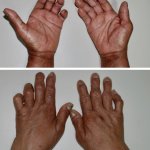Rheumatoid arthritis (RA) is characterized by polyarthritis, especially involving hands and wrists. Without treatment, RA usually evolves to articular deformities. Unfortunately, although rheumatoid deformities are characteristic, they are not pathognomonic, and we should be aware of possible mimics.1 Neuropathic arthropathy (NA), similar to other diseases, such as hemochromatosis, psoriatic arthritis, calcium pyrophosphate deposition disease, Jaccoud…




